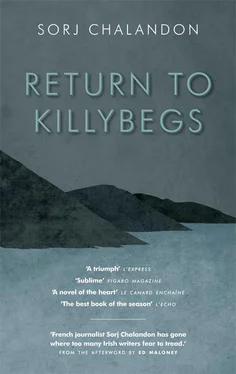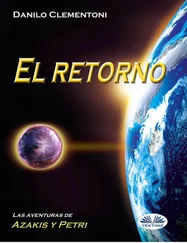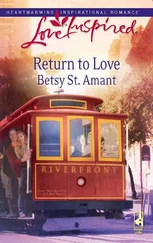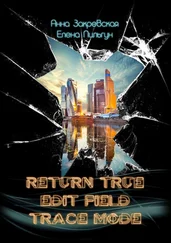I stepped on to the platform. He was keeping watch. His eyes murmured that everything was quiet, no danger. That nobody had followed me. When the train left again, he gave a slight nod. Barely a movement, a signal between the two of us. And I saw him in his crowded carriage, his cap on his head, that smile on his lips, so certain that he’d protected our Republic.

I thought about that exchanged glance for a long time afterwards. I didn’t even tell Waldner or Honoré about the encounter. A few weeks later, in Belfast, I took Antoine to one side. Under no circumstances was he to disclose my presence in France to anyone. Ever. Not even to our friends in the movement. That was the rule when he was putting me up in Paris, it was even more important this time. And he understood. Of course, obviously, he understood. He was listening to Tyrone Meehan with the same degree of attention as you give to the first notes of your national anthem. He didn’t try to understand my war, he was living his own.
I could have told him all of that. I owed him a portion of the truth. I owed him a different perspective, the real one, that of the corrupted man, the disloyal one, that of the infidel. I wanted him to confront those eyes, for him to know them. And also for him to know the weak and hounded man. Inviting him to my deathbed was a way of offering him what was left of me.
— Do you know that I’m going to die, son?
His silence told me he didn’t.
— My God! You really don’t know anything about this country.
I moved away from the whitewashed wall. Sheila had just beeped the horn. She didn’t want to come in. She was against this visit and didn’t understand why I had accepted the presence of a foreigner.
Antoine got up. He was cold, his lips grey. I went to the door, opened it for him. I suppressed my gestures. I knew they would be our last.
— You haven’t answered me, Antoine murmured.
I was frozen, as though my body were in a tomb. I was hurting. A sharp pain, a knife being dragged from throat to heart. And I opened my arms. To him, and to Jack, whom I was missing.
Without a word, he took refuge in my damp jacket, my old woollen jumper, my winter scarf, my frozen coat. I felt the shabbiness of the Kesh blankets. That sickening mix of sourness, man and dog. We remained standing like that a moment.
I could have answered him.
For me, he was simultaneously the foreigner and my people. He who had seen me and he who would never see me again. He was the wee Frenchman and the whole of that Ireland he followed step by step. He was a bit of Belfast, a bit of Killybegs, a bit of our old prisoners, our protests and our fury. He was Mickey’s look, Jim’s smile. He was our victories and our defeats. He had loved this land so very much that he was part of it.
Was that friendship? I didn’t have an answer. Had I betrayed that love? Of course I had betrayed it. I had hidden myself behind Antoine, behind his courage and his convictions. I was unable to feel either guilt or remorse for that. It was also too late for forgiveness or a sudden crisis of conscience. The traitor and the betrayed, in one another’s arms. Yes, the man from the Parisian metro had used him. And so? Did that change this gloomy embrace?
He wore his city coat and black woollen gloves. My back was bent, my hair a mess, my cap wet, my crumpled trousers stuffed into muddy boots. He gave me a look I didn’t want.
I turned my back to him, raised a hand to say goodbye.
They could come and death could take me. It didn’t matter.
I met Antoine in the Thomas Ashe in April 1977. He claimed I taught him to piss that night, but I have no memory of it. I saw him from a good way off, at the back of the room, sitting with Jim O’Leary and his wife, Cathy. Aside from two Basque sympathizers lost in the crowd, he was the only one wearing a Republican T-shirt. Everyone in the place was connected to the IRA, everyone except those who publicly glorified it.
At first, I took him for an American, the kind who shivers over his Irish roots, cries as he places his feet on our soil for the first time, and rushes off to buy a white Aran sweater and a tweed cap. The kind who loves everything about Ireland, from its mud to its rain, from its poverty to its misery. The kind who wants to make himself useful, asks for a gun, but is wary all the same of giving us his passport and declaring it lost at the American consulate.
And then I looked at his lips, their extreme mobility, that particular way the French have of elaborately chewing their words. He was speaking with his mouth open, the way people without secrets do.
I saw him again the following day, for the Easter parade. I was getting the Fianna to line up in the street when I caught his eye. He was crying. He was watching the crowd, our wives, our children and our men, and he was crying. Not the way a child or someone who is hurt cries, but silently, taking advantage of the rain to disguise his tears. When the hundreds of former prisoners lined themselves up in rows of three alongside widows carrying wreaths, and their children in their Sunday best, he turned to face the wall. The wee Frenchman wasn’t like the other visitors. He wasn’t observing our suffering, he was sharing it.
It was cold. We set off down the road and he followed us, one of the family now. A little earlier, I had called him ‘son’ for the first time. I’d positioned him on the corner of Divis Street, promising him a surprise. The IRA was my surprise. Several dozen fighters in parade uniform, wearing black berets and white belts. I looked at my men through his eyes. I felt his shudder. He had arrived the evening before and found himself plunged into the war. The helicopters, the armoured vehicles, our flags, our fifes, our drums. What did he see? Shadow soldiers, children without fathers, wives without anything left at all. Sad and weary, ours was a solemn portion of humanity, with our silent companions — poverty, dignity and death. Like him, my gaze was brushing over the worn coats, the muddy shoes. Like him, I looked at the rain-drenched hair, the exhausted faces. I glimpsed my bleak shadow in the reflection of a window. I couldn’t disown any part of these people. They were made of me as I was moulded from them. And Antoine stood there with his mouth agape. I was touched, and I was proud, too. My country was giving him a gift.
That April Sunday was the first and last time I saw Antoine cry. Much later, years afterwards, I asked him why. He simply replied that the tears had been his way of applauding us.

When I got out of the Kesh, I learned that Antoine had been used by the IRA. Appalled by my arrest, my laughable trial and sentence, and disgusted by the dirty protest, he had begged Jim O’Leary to find him a task, a role, some little thing he could do to help.
Ireland’s war is the business of the Irish. I have always distrusted foreigners who wanted to fight at our side. As for explaining our position to people in their own country, organizing information meetings, holding press conferences, mustering up demonstrations? Yes, of course, a thousand times. But I never considered entrusting them with a single round.
— That attitude will be the death of us, Jim used to say. Connolly taught us internationalism, not the cult of borders!
— The IRA isn’t an army of mercenaries, I’d reply.
He’d burst out laughing.
— Mercenaries, Tyrone? What do you mean by mercenaries? When your father wanted to fight for the Spanish Republic, was he a mercenary?
He got on my nerves. He was right, he was wrong, depending on my mood. I didn’t want a stranger to die in our war, or be taken prisoner. That was all. I imagined the British propaganda, the press, the Unionists. The IRA? A bunch of French, Americans or Germans looking for a revolution. The IRA? The newest attraction for Western leftists. Wake up, Ireland! Look who’s fighting on your soil in your name!
Читать дальше













